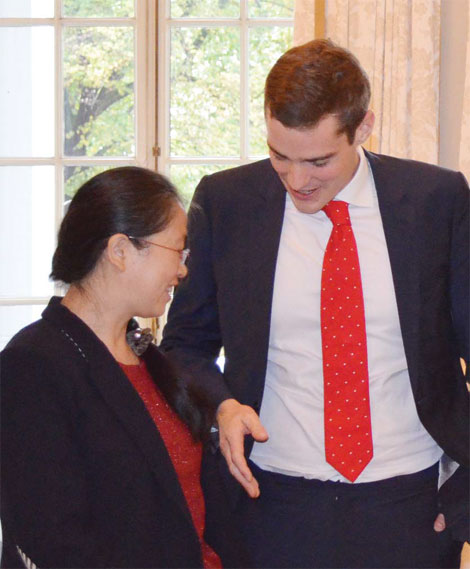The accidental learners

Pair who took up the language now use it in their work
Adam Cotter says his journey to study Chinese happened by accident. "It was just after I'd graduated from university, and a friend wanted to go to China and study Chinese for six months, so he asked me to go with him."
It was in 2006, when China's economy was booming, and Cotter's friend wanted to learn Mandarin to improve his career prospects. The pair traveled to China by train from Europe through Russia and Mongolia to the Chinese city of Xiamen, where they stayed for a few months teaching English.
| A Chinese teacher helps a British pupil with his work. Many people in the UK choose to learn Mandarin because of the job opportunities it opens. Photos provided to China Daily |
| Adam Cotter, programs manager for Asia at the Official Monetary and Financial Institutions Forum, says his Mandarin helps a lot in his day-to-day work. |
"I was naive in thinking that I could learn Mandarin in six months.After being there I realized a lot more work was needed," Cotter says. After a few months Cotter's friend decided to return to Britain and Cotter stayed to learn the language properly.
Looking back, Cotter says the experience was valuable and he would go to China and face the challenge of learning Mandarin if he had the choice again today.
He is now programs manager for Asia at the Official Monetary and Financial Institutions Forum, an organization in London that facilitates discussions on financial topics. In his day-to-day work, he interacts with Chinese organizations such as the People's Bank of China, and there his Mandarin comes into its own.
"The top-level people in these Chinese organizations are very good at English, but in order to set up meetings with these people I have to contact a lot more of their colleagues in more junior roles, and having conversational Chinese greatly helps."
In addition, he translates marketing material and other documents into Chinese.
Cotter is one of many Britons who have learned Mandarin. British Prime Minister David Cameron has said he wants the number of Mandarin students to increase to 400,000 by 2016.

However, like Cotter, many of these students have discovered their love for China and for Mandarin in unexpected ways, before continuing to learn the language through structured classes and through working in China.
One of them is Rhys Whalley, the executive director of Manchester China Forum, an organization set up to promote China's business links with Manchester and the English Midlands.
"My experience of learning the language is rather unique in that I did not undertake much in the way of formal Mandarin language education," Whalley says.
"Rather, I was fortunate enough to be immersed in Chinese language and culture, having moved from the UK with my wife (girlfriend at the time) to work for the European Chamber of Commerce of China in 2005." Being based in Beijing meant he was at the center of Chinese language and culture, which made learning easier and more enjoyable.
"Beijing is an excellent city in which to learn the language not only because the vast majority of its residents speak standard Putonghua but also because the people of Beijing are so open to engaging in conversation with foreigners.
"Taxi drivers in particular were an excellent source of practice for me in the early days as I was able to repeat a number of simpler conversations and build up my vocabulary through engaging in familiar conversations. Very rarely did I find myself in a taxi where the driver was not interested in learning about my country of origin and discussing the latest performances in the English Premier League."
In 2013 Whalley joined the newly created organization Manchester China Forum and now he uses Mandarin frequently in his job. He regularly engages with friends from the Chinese consulate as well as the growing number of Chinese organizations in Manchester. He also travels regularly to China, where he uses his Mandarin in meetings and for presentations.
"Through regular conversation I am continuously learning new things and improving my language. Naturally, since relocating back from Beijing to Manchester to 2013, I do not have the same level of daily exposure to the language; however, Manchester has a rich history of engagement with China and provides very easy exposure to the language and culture," he says.
Cotter, after the initial months in Xiamen, was sent by the English language school to Chengdu to be in charge of opening a new branch of the school.
"After arriving in Chengdu, I made the decision to switch from a full-time worker and part-time student to full-time student and part-time worker," he says, adding that he was determined to be good at the language.
He studied Chinese at Sichuan University, and enjoyed the atmosphere of being surrounded by students from around the world who enjoyed learning Mandarin. It was a happy time of sharing and learning together.
The study was difficult, he says, especially learning Chinese characters. But he loved the challenge of learning vocabulary and chengyu, traditional Chinese idiomatic expressions, most of which consist of four characters.
After studying at Sichuan University he went to Beijing to work for an art gallery that specialized in French paintings. He was in charge of selling these, and that experience giving him an opportunity to practice his Mandarin.
He worked at the gallery for 18 months, before starting to freelance for a friend's company, helping Chinese students apply for universities in the UK and US. This lasted for a year, just before he decided to return to the UK in 2011.
When he came back, Cotter went to the University of Nottingham for a master's degree in Chinese economics. "I've always wanted to do a master's degree, and I'm interested in economics. I thought learning Chinese economics would help me with my job prospects, because I can work for organizations with a China focus."
The learning experience was an eye-opener, he says, and a lot of the economic phenomena he had encountered in China suddenly made much more sense after studying the academic theory behind them, such as the importance of state-owned enterprises and China's infrastructure boom.
His course included an element of language learning in which he attended Mandarin classes that focused on Mandarin for academic research and business two or three times a week.
"I found the learning process harder because there wasn't the environment to practice. In China, after I finished a class I could turn on the TV and hear Mandarin, or listen to people speaking Mandarin on the bus."
Cotter recommends Mandarin to other students and says he believes the increase in Mandarin studies in Britain is a good thing.
Most people in the UK probably choose to learn Mandarin because of the job opportunities it opens, he says, but he sees Mandarin as an enjoyable language to learn.
"I think Mandarin is a great language with so much history behind it. It is also very different from European languages, and it's a great challenge."
Cotter's words are echoed by Whalley, who adds that Mandarin is a language that one needs to continuously learn and improve on.
"When people ask me about my level of fluency in the language, my standard response is that I will never be able to become fully fluent. I am always amazed by the depth of the language - something that excites me in that I will always have something new to learn."
cecily.liu@mail.chinadailyuk.com
(China Daily European Weekly 11/20/2015 page8)
Today's Top News
- Japan tempting fate if it interferes in the situation of Taiwan Strait
- Stable trade ties benefit China, US
- Experts advocate increasing scope of BRI to include soft power sectors
- New engine powers cargo drone expansion
- China to boost green industry cooperation
- Manufacturing PMI rises in November
































